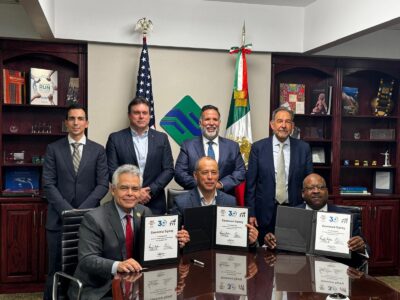
The Texas A&M Transportation Institute (TTI), Texas A&M International University’s (TAMIU) A.R. Sanchez, Jr. School of Business Texas Center for Border Economic and Enterprise Development (TCBEED) and the North American Development Bank (NADBank) recently announced the launch of a transformative $250,000 study to analyze the impacts of implementing zero-emission vehicles (ZEVs) in cross-border trade operations.
The Electric Truck Cross-Border Drayage Comparative Pilot Study, officially signed at NADBank’s San Antonio headquarters, represents a significant step forward in advancing sustainable transportation solutions along the U.S.–México border. The project brings together leading academic institutions, industry partners and development organizations to analyze the economic and environmental feasibility and impact of electric and natural gas-powered commercial vehicles in cross-border operations.
“We are pleased to award these funds, which marks the second air quality project funded by the Bank in as many years related to the links between air quality and international commerce in Laredo, which is the largest port for U.S.–México trade,” said Salvador Lopez, chief environmental officer at NADBank. “These funds came through the Bank’s Technical Assistance Program that provides grants to help border communities and other project sponsors create the knowledge necessary to help build more sustainable border infrastructure.”
The year-long study will focus on the Laredo-Nuevo Laredo port of entry, which processes nearly six million commercial vehicles annually and is the primary gateway for U.S.–México trade. The research will be conducted in partnership with Forza Transportation Services and Trayecto GTM-Larmex, which will provide electric and natural gas vehicles for real-world testing and data collection.
“This research represents a crucial step in understanding how zero-emission technologies can transform cross-border logistics,” said TTI Chief Executive Officer and Agency Director Greg Winfree. “The data and insights gathered will help shape the future of sustainable transportation infrastructure along the border.”
The project will also examine potential environmental impacts and emissions reductions, operational efficiency and cost-benefit analysis, infrastructure requirements and logistics adaptations, and economic implications for the transportation industry.
Juan Villa, TTI research scientist and manager of the International Trade and Border Transportation Program, and Dr. Daniel Covarrubias, director of TAMIU’s TCBEED, will serve as co-principal investigators, leading this comprehensive evaluation.
“The complexity of cross-border operations requires a careful analysis of how zero-emission vehicles can be effectively integrated into existing logistics chains,” said Villa. “Our partnership with TAMIU and industry stakeholders positions us to provide comprehensive insights into this transition.”
Dr. Covarrubias added: “This study comes at a critical time as we see remarkable growth in cross-border trade through Port Laredo. Understanding the practical implications of ZEV adoption will be crucial for maintaining our region’s competitive advantage while advancing environmental sustainability.”
Dr. Luis Pérez-Batres, dean of TAMIU’s A.R. Sanchez, Jr. School of Business, emphasized the project’s regional significance, stating: “This pivotal study will deliver critical insights to unlock opportunities in sustainable cross-border transportation, driving progress for communities in the Laredo region and across North America.”
The results of this comprehensive study will inform policy decisions, infrastructure planning and industry practices, establishing a framework for the broader adoption of zero-emission vehicles in cross-border trade operations.